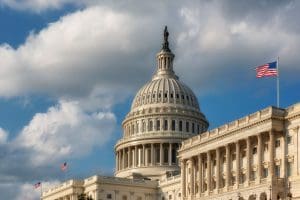The economic crisis caused by the coronavirus pandemic poses a triple challenge for tax policy in the United States. Lawmakers are tasked with crafting a policy response that will accelerate the economic recovery, reduce the mounting deficit, and protect the most vulnerable.
To assist lawmakers in navigating the challenge, and to help the American public understand the tax changes being proposed, the Tax Foundation’s Center for Federal Tax Policy modeled how 70 potential changes to the tax code would affect the U.S. economy, distribution of the tax burden, and federal revenue.
In tax policy there is an ever-present trade-off among how much revenue a tax will raise, who bears the burden of a tax, and what impact a tax will have on economic growth. Armed with the information in our new book, Options for Reforming America’s Tax Code 2.0, policymakers can debate the relative merits and trade-offs of each option to improve the tax code in a post-pandemic world.

Three Reasons Why Dynamic Scoring Still Matters
Lawmakers should use the most comprehensive analytical tools available to them—like dynamic scoring—to make informed decisions about policy changes.
5 min read
In the Shadow of T-TIP: Why Congress Should Care About EU Tax and Trade Issues in 2023
The EU’s unilateral approach with carbon taxes, faster track on the global minimum tax, and threat of renewed efforts on DSTs means that U.S. policymakers face some hard choices. Policymakers on both sides of the Atlantic should keep in mind pro-growth tax and trade principles that promote a rules-based international order and increase opportunity.
7 min read
Taxes in Everything: Die Hard Edition
It’s Christmas time, and for millions of families around the country, that means revisiting some classic holiday movies. For some, that includes It’s a Wonderful Life and Home Alone. For others, that includes Die Hard.
3 min read
Improved Tax Treatment of Saving Included in Year-End Federal Spending Deal
The year-end omnibus federal spending package makes a number of reforms to retirement savings accounts.
3 min read
Digital Services Taxes: Is There an End in Sight?
As it stands, Pillar One would usher in the end of many digital services taxes (though perhaps not all) at the cost of increased complexity (in an already complex and uncertain system).
4 min read
Would Americans Make Charitable Donations without Tax Incentives?
Over the long run, tax policies that grow after-tax incomes and the economy do more to boost charitable giving than policies that try to incentivize people to be charitable.
9 min read
Changing Trends in R&D Investment Show the Importance of Business R&D
Lawmakers should recognize both the growing importance of business R&D and the need to support it through a commonsense tax policy, namely a return to full and immediate expensing for R&D.
6 min read
Chile’s Tax Reform Heads in the Wrong Direction
As Chile looks to the future, the accelerated deductions for capital investment costs should be extended and made permanent while unnecessary tax hikes on individuals and capital should be avoided. Policymakers should focus on growth-oriented tax policy that encourages investment, savings, and entrepreneurial activity, increasing Chile’s international tax competitiveness.
4 min read
Return to R&D Expensing Crucial for Manufacturing and Technology Investment
The tax treatment of research and development (R&D) expenses is one of the biggest issues facing Congress as the year winds down.
5 min read
The Future of Tobacco Taxation in Europe
Later this week, the European Union is expected to release a new Tobacco Tax Directive, the first update in more than a decade. Early reports indicate that the EU will propose a significant increase to the existing minimum cigarette tax rates levied across the Union and expand the product categories that are taxed, including a block-wide vaping tax.
7 min read